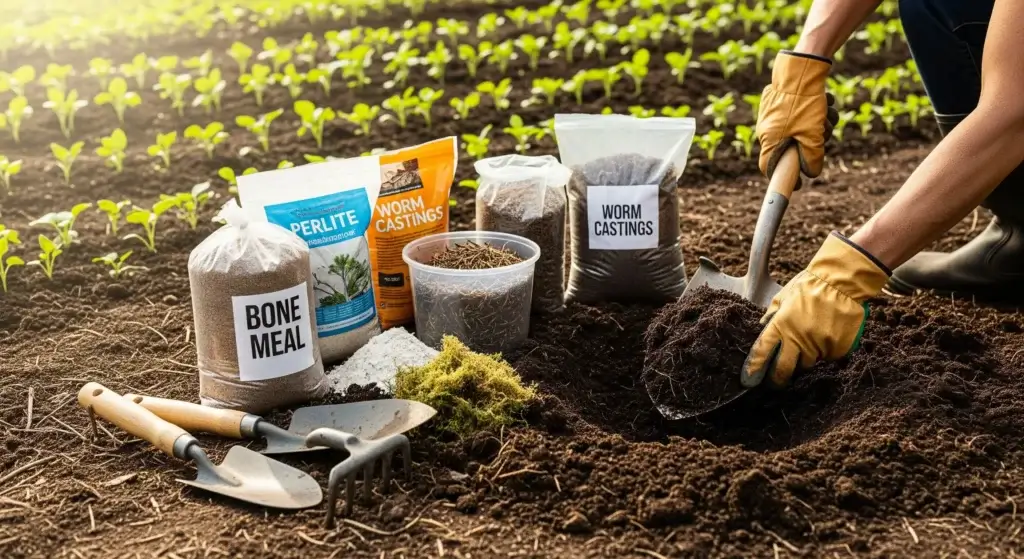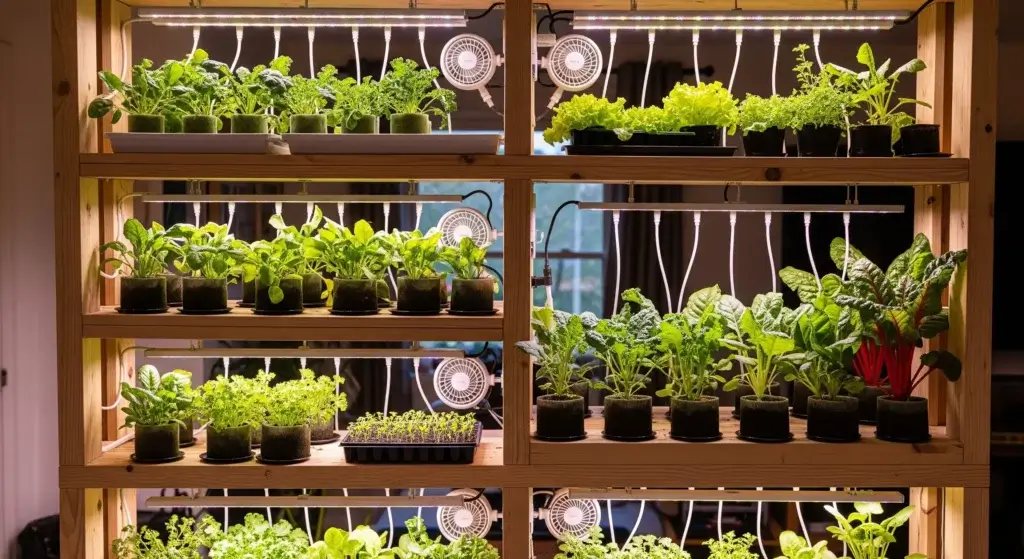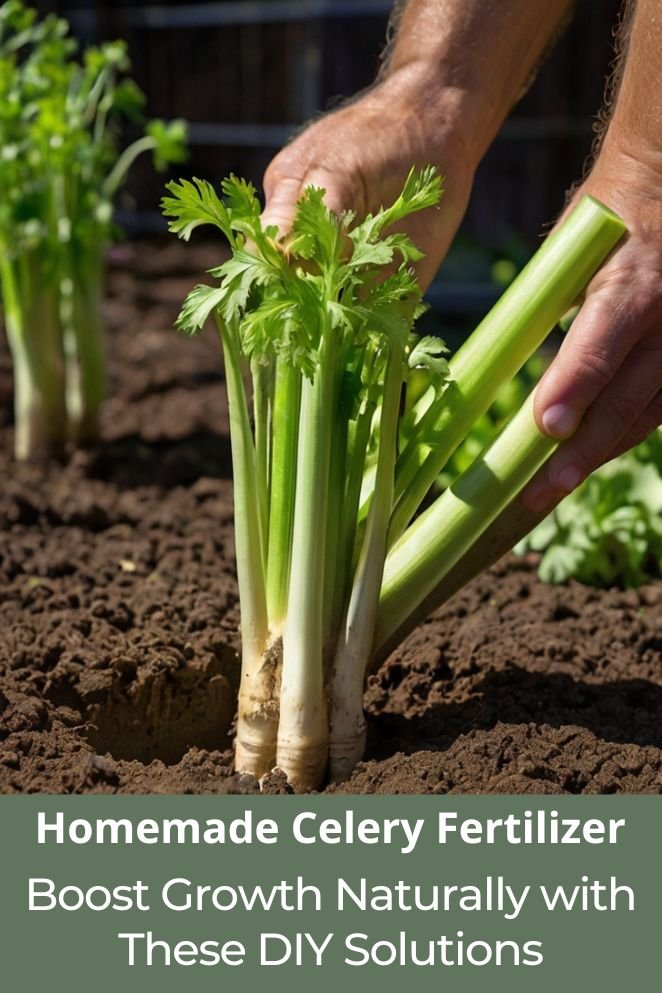
Celery doesn’t get much love—but grow it right, and it’s crisp, tasty, and totally underrated.
The catch? It’s a high-maintenance garden diva. Without the right nutrients, you’ll get sad, stringy stalks.
The fix? Skip the store-bought stuff.
This guide shows you how to feed your celery using DIY fertilizers made from things like coffee grounds, compost, and kitchen scraps.
If you’re into low-cost, eco-friendly hacks that actually work, your celery is about to thrive.
Let’s turn this picky veggie into a garden rockstar—on a budget.
Why Celery Needs Extra Nutrition
Celery is basically a nutrient junkie—it munches through soil like it’s at an all-you-can-eat buffet.
It needs a steady hit of nitrogen, potassium, calcium, and phosphorus, or else it throws a tantrum with:
- Skinny, hollow stalks
- Yellow, droopy leaves
- Bland, sad flavor
- Slow, scraggly growth
If you want celery that’s crisp, tasty, and Instagram-ready, start with soil that’s primed and fed.
Get those nutrients right, and your celery will thank you by actually tasting awesome.
Before we dive into the good stuff (aka DIY celery food), here’s why going homemade is kind of a big dill—yes, pun intended:
- Budget-friendly – You’re basically turning kitchen scraps into plant gold. Your wallet will thank you.
- No sketchy chemicals – Just the good, clean stuff your soil, celery, and backyard bees deserve.
- Eco-friendly vibes – Less trash, less guilt, more green. Mother Nature sends her love.
- Totally customizable – Celery can be picky. With DIY, you can tweak the mix to give your stalks exactly what they’re craving.
Think of it like meal prepping, but for your plants—only without the Sunday scaries.
Alright, grab your compost bin and your inner Bob the Builder. Let’s get to the best homemade fertilizers your celery has ever tasted.
- Read also: How to Treat Celery Leaf Spot: Effective Methods
- Read also: Summer Celery Watering Schedule: Keep Your Celery Thriving
7 Homemade Celery Fertilizers
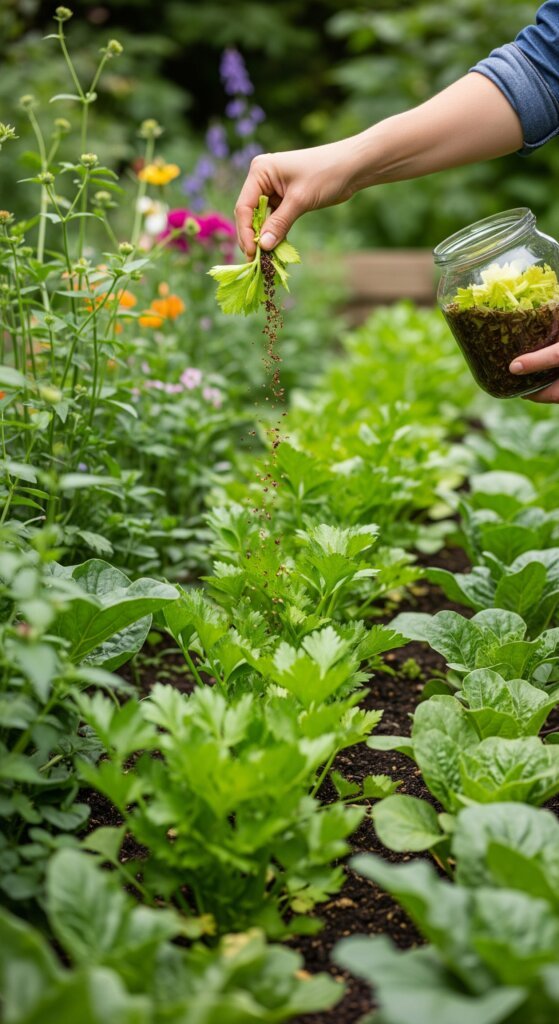
1. Banana peel tea – rich in potassium and phosphorus
Best for: Building thick, crisp celery stalks and deep, healthy roots
How to make it:
- Grab 2–3 banana peels (bonus points if they were in a smoothie)
- Chop ’em up like you’re prepping for a fruit salad
- Toss the pieces into a jar with about a quart of water
- Let it steep for 1–2 days like you’re brewing tea for Mother Earth
- Strain and pour that potassium-packed potion around your celery’s base
Why it works:
Banana peels are basically plant multivitamins.
They’re loaded with potassium, phosphorus, and even a little calcium—perfect for stalk strength and root growth.
Think of it as weight training for your celery
2. Coffee grounds – boost nitrogen levels
Best for: Lush, leafy growth and that deep green glow
How to use it:
- Sprinkle used coffee grounds directly into the soil around your celery—don’t overdo it
- Or make a “cold brew”: soak the grounds in water overnight, then pour around your plants like you’re giving them a Starbucks moment
Pro tip:
Go easy! Coffee grounds can make soil a bit acidic if you go full Lorelai Gilmore with them.
Mix with compost or other neutral materials to keep the pH celery-friendly.
Why it works:
Nitrogen is the VIP nutrient for leafy veggies like celery. Coffee grounds deliver it in style—no barista required (Journal of Agricultural and Food Chemistry, 2018).
3. Eggshell powder – adds calcium for stronger stalks
Best for: Preventing flimsy stems and those dreaded burnt leaf tips
How to Prep It:
- Rinse out those eggshells (no one wants scrambled eggs in the soil)
- Let them dry completely—sun, counter, air fryer, you do you
- Grind them into powder using a blender, food processor, or your inner Hulk
- Sprinkle around the base of your celery or mix into compost for a calcium boost
Why it works:
Eggshells = plant calcium with a crunchy twist.
Calcium strengthens cell walls and helps prevent calcium deficiency—a common issue in celery that leads to weak growth and browning tips.
Think of it as a bone-building smoothie… but for plants.
4. Compost tea – all-in-one nutrient booster
Best for: All-around plant health and giving your soil some serious TLC
How to brew it:
- Scoop some aged, earthy-smelling compost into a mesh bag (an old sock works in a pinch—no judgment)
- Dunk it into a 5-gallon bucket of water
- Let it steep for 24–48 hours, stirring now and then like a garden witch’s potion
- Pour this magic brew around your celery for a full-body nutrient hug
Why it works:
Compost tea is the ultimate all-in-one: packed with macro and micronutrients, plus a squad of beneficial microbes that turn your soil into a living, breathing support system.
Basically, it’s celery’s version of kombucha—alive, funky, and ridiculously good for them.
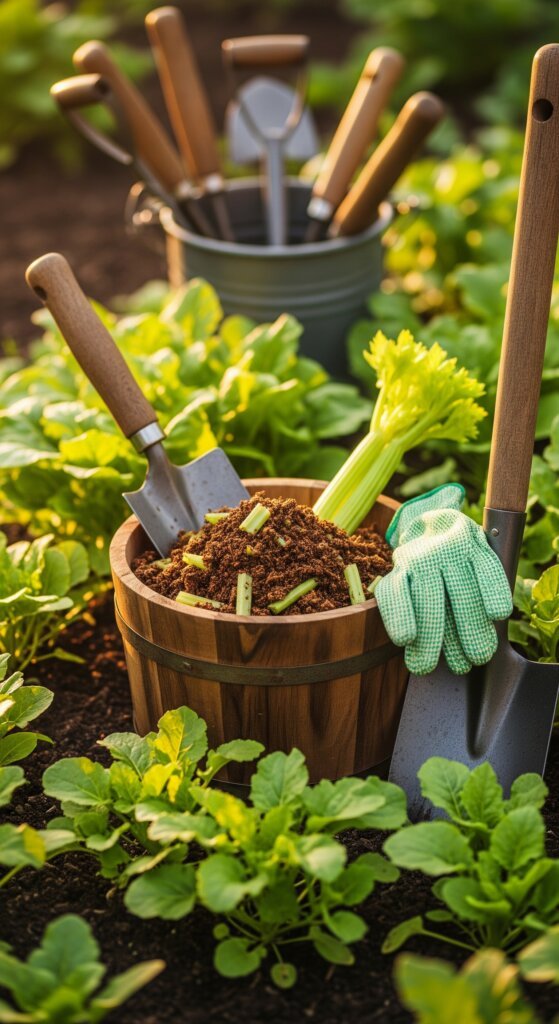
5. Epsom Salt Solution – supplies magnesium and sulfate
Best for: Boosting chlorophyll, helping celery soak up other nutrients like a boss
How to mix:
- Dissolve 1 tablespoon of Epsom salt in 1 gallon of water
- Water your celery with it every 2–3 weeks like it’s on a wellness routine
Why it works:
Magnesium = photosynthesis MVP. Without it, your celery struggles to stay green and vibrant.
Epsom salt steps in like a personal trainer for plant cells—helping them convert sunlight into energy like pros (National Gardening Association).
Basically, it’s like feeding them green juice… but it actually works.
6. Fish emulsion – a nitrogen-packed organic option
Best for: Speedy growth in the early stages (when your celery’s still figuring life out)
How to DIY:
- Got fish scraps? Blend ‘em with water (1 part fish to 2 parts water)
- Let it ferment in a sealed container for 2–3 days—yes, it’s funky
- Strain, dilute with water, and feed to your celery babies
No fish scraps? Totally fine.
Grab a bottle of organic fish emulsion from the store and skip the fishy situation in your kitchen.
Why it works:
Fish emulsion is like Red Bull for your young celery—packed with nitrogen to fuel fast, leafy growth.
But instead of wings, they get crisp stalks and vibrant leaves. Smells bad, works great.
7. Seaweed tea – full spectrum mineral boost
Best for: Boosting immunity, reducing stress, and helping celery thrive through drama (heat, pests, transplant shock—you name it)
How to make:
- Collect clean seaweed (only if it’s legal and ocean-approved in your area)
- Rinse off the salt and soak it in a bucket of water for a few days
- Use that briny, mineral-rich tea to water your celery
Why it works:
Seaweed is the OG multivitamin.
It’s packed with over 60 trace minerals and natural plant hormones that help celery glow up under pressure.
Think of it as celery’s adaptogen. If your plant had a skincare routine, seaweed would be step one.
How to Use Homemade Fertilizers for Celery: Timing & Tips
Let’s be real—feeding your celery isn’t just about dumping banana water and calling it a day.
Timing matters.
Think of it like a skincare routine: what you apply and when you apply it makes all the difference.
Here’s your no-fuss, green-thumb-approved guide to homemade celery fertilizing:
Fertilization schedule:
| Growth Stage | Recommended Fertilizer | Frequency |
| Seedling Stage | Diluted compost or fish emulsion | Once a week |
| Mid-Growth | Banana tea, coffee grounds | Every 2 weeks |
| Pre-Harvest |
Epsom salt, eggshell powder
|
- Read also: A Step-by-Step Guide: How to Regrow Celery From Scraps
- Read also: Winter Celery Care Tips: Keep Your Celery Thriving in Cold Weather
Application tips:
- Water after dry fertilizers – Always follow up with a good soak so those nutrients actually reach the roots. Think of it like helping the vitamins dissolve.
- Mix it up – Alternate your fertilizers like you’re building a balanced diet. Celery doesn’t want all carbs or all protein—it wants the whole menu.
- Don’t overdo it – More isn’t better. Overfeeding can backfire and stress your plant out. Your celery wants care, not chaos.
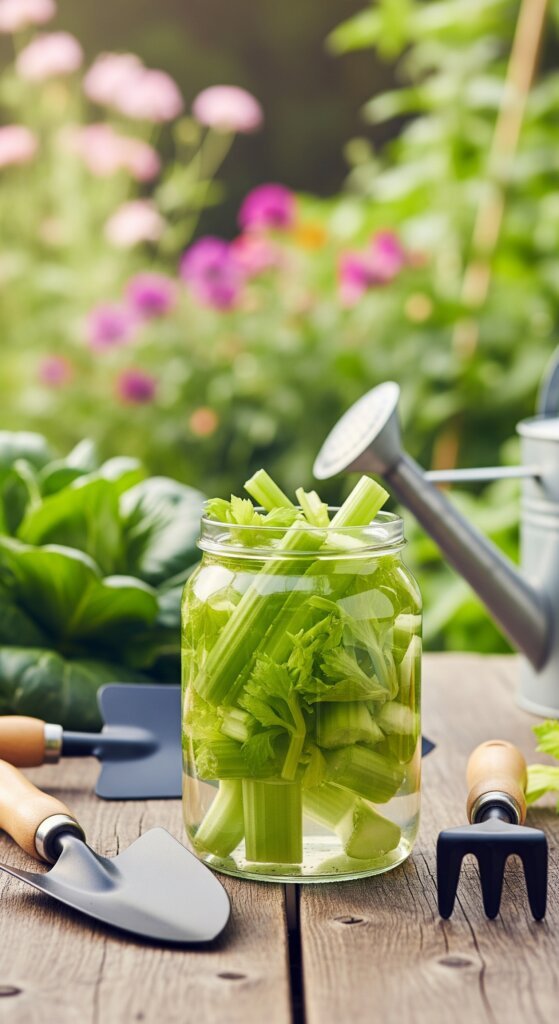
Conclusion: Grow Stronger, Greener Celery—Naturally
You don’t need fancy fertilizers or a PhD in dirt to grow killer celery.
With a bit of kitchen magic (hello, banana peels!), you can make homemade, eco-friendly plant food that’s safe and super effective.
Whether you’ve got a backyard jungle, a balcony garden, or a raised bed fit for a garden show, these DIY feeds will give your celery the VIP treatment.
The secret? Feed it right, feed it on time.
Think of it as celery’s version of self-care—because happy plants = crunchy, juicy rewards.

